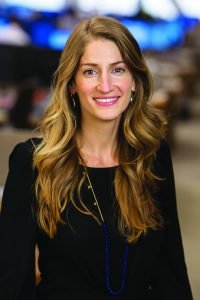From the record-breaking heatwave in the United Kingdom to extreme flooding in coastal areas, climate change is rapidly taking its toll on our world and communities. Abigail Pohlman, Head of Goldman Sachs’ Private Wealth Management Sustainable Solutions Group, has observed how the worsening climate crisis not only harms our environment but also exacerbates global and societal inequalities.
Eager to play a role in developing a more sustainable future, Abigail matriculated at UCLA, where she majored in International Development Studies. This unique program allowed her to dive deep into the study of the discriminatory social, political, and economic forces that shaped our current climate crisis. After graduating, Abigail joined the Larta Institute, a nonprofit devoted to fostering sustainability through innovations in science and technology.

After a few years in the nonprofit world, Abigail wanted to find a way to broaden her impact. “I decided that in order to hone my abilities, I needed to understand the corporate world, and learn how businesses are run and what that strategy looks like,” explained Abigail. “My plan was to then take that knowledge back to the nonprofit space.”
To her surprise, she found herself all the more inspired while working as an analyst for Goldman’s Los Angeles Private Wealth Management team. “I realized that I had hit my stride,” she said. “I was working with a number of different nonprofit clients and implementing customized investment strategies in order to help them grow and create a positive impact.”

Abigail credits John Mallory, the co-head of Global Private Wealth Management, with helping her pursue her ever-growing passion for sustainability and equality: “He’s been there from day one, supporting and championing me and my passions and providing opportunities along the way.”

Embraced by a culture of both camaraderie and innovation at Goldman, Abigail was encouraged to follow her passions and develop her own projects. In 2009, Abigail and John Mallory developed Goldman’s Institutional Client Solutions (ICS), a group that provides individualized investment guidance, education, resources, and solutions to help nonprofits both achieve their financial goals and invest in ways that align with their values and missions.
“We built ICS together, and it grew into my full-time job,” Abigail commented. “It’s actually similar to the work I was doing before with nonprofits, but this was an opportunity to formalize it.” ICS now works with over 600 nonprofit clients across the country, ranging from educational institutions to hospitals and medical centers. Describing what she loves about the connections that ICS forges between organizations and individuals, Abigail said, “It allows us to tie in the work we’re doing with communities across the world to the work we’re already doing with our high-net-worth clients. A lot of our high-net-worth clients are already involved in these nonprofits that we’re working with, and if not, we provide them an opportunity to get started. It’s wonderful to see our work coming full circle.”
Even after developing ICS, Abigail felt that she could do more. She approached the co-heads of Goldman Sachs Private Wealth Management, John Mallory and Meena Flynn, and told them that she wanted to be able to offer high-net-worth clients a better, more cohesive offering for sustainable and impact investing.
“They told me that if I had an idea, I should go ahead and build it. So, with that greenlight, I went ahead and started our Sustainable Solutions Group.” With the support of her team, Abigail designed a group that would combat the damage and inequalities of climate change while also working to advance inclusive growth. Developing the Sustainable Solutions group has been simultaneously invigorating and challenging.
“There wasn’t a blueprint, so it’s been an exciting journey,” she said. “The hard part is not being able to turn to someone who’s done this before. I’ve needed to draw the map myself. Every day I get to decide how we’re going to prioritize, how we’re going to make a difference.”
Abigail regards sustainability as a pillar in the investing world, not just a trend. Sustainable impact investing has skyrocketed in popularity, a development that Abigail has played a pivotal role in facilitating. “Many of our clients understandably feel overwhelmed and skeptical when it comes to impact investing. Being able to sift through options and break it down into actionable steps is something that I consider to be a core and essential part of our job.”
In addition to her Private Wealth Management clients and nonprofit ICS organizations, Abigail also works with corporations and even governments to help them understand and tackle sustainability issues and transitions to renewable practices. “We’ve all set very ambitious net-zero targets for 2030 or 2040, and that’s going to require the right kind of investment. We’re going to have to improve not only our technology, but also our infrastructure. To achieve those goals, we need to properly invest in companies at every level of the supply chain.” Abigail helps her clients to become key players in the development of renewable technology, energy, and infrastructure.
Impact and sustainable investing is an option that is accessible to everyone, both individuals and institutions alike. Abigail encourages her clients to think of it not as a limited option, but rather as “an additional tool in your toolkit. There’s no reason to hold strategies that incorporate sustainability to a different standard than other potential strategies or opportunities.” Since 2015, the Sustainable Solutions group has seen unprecedented growth in sustainability and impact investing. There has been over an 80-fold increase in the number of assets for Abigail’s clients that are invested in sustainability and other impact strategies. “Out of our largest 500 clients, over 50 percent of them are actively incorporating sustainability into their investment strategies,” she said. Sustainability is not only a priority that Goldman encourages for their clients, but a value that is embraced across the firm. “We, as a firm, have a commitment to investing over $750 billion in sustainable finance by 2030,” Abigail explains.
In addition to being grateful for the encouragement that she received while developing the Sustainable Solutions group, Abigail feels supported in all aspects of her work at Goldman. She counts herself lucky to be involved in an institution that is ahead of the curve in their emphasis on diversity, equity, and inclusion (DEI) and inclusive hiring practices: “A lot of people don’t know this, but there’s actually a Women’s Council at Goldman that I serve on.” Additionally, Abigail was an integral player in the development of Goldman’s In the Lead platform, a platform designed to help high-net-worth women take charge of their wealth, philanthropy, and legacy. Abigail carries her support for DEI and gender equality into her work in Sustainable Solutions; climate change impacts women, minorities and low-income people first. Abigail encourages her clients to think about gender in the context of their investment portfolios, advocating for including more women and women of color in leadership and decision-making roles.
“Over half of Goldman’s regional offices are led by women,” she explained, “many of whom have been my mentors and peers over the years. To have grown in this business surrounded by women has been a huge factor in my success and the success of the firm as a whole.”
Abigail’s diverse experience interfacing with all aspects of the corporate and nonprofit worlds has given her a distinctive perspective on the power of impact investing. From being a leader on Goldman’s Women’s Council to advising nonprofits and governments on the transition to renewable infrastructure, she feels proud of the impact she’s already been able to achieve as Head of Goldman’s Sustainable Solutions Group. She knows, however, that there’s still work to be done.
“As stewards of big pools of capital, we have to ask ourselves if we’re using our wealth to define the world we want to live in. How are we going to leave the world in a better way than we found it?”







